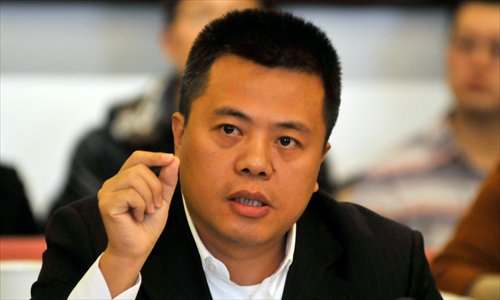Founder quits Shanda Games
Company sells off 18% stake as it undergoes privatization

Chen Tianqiao File Photo: CFP

Chen Tianqiao, founder of Shanda Games Limited, stepped down on Thursday as the chairman of the NASDAQ-listed gaming company which is currently going through privatization.
Shanda Interactive Entertainment Limited, the former controlling shareholder of Shanda Games, sold an 18 percent stake in Shanda Games to Ningxia Zhongyin Cashmere International Group and Yili Shengda Investment Holdings (Hong Kong) Co, Shanda Interactive said in a statement.
After the sale, Shanda Interactive no longer owns any shares of Shanda Games, and Chen also quit all positions that he had held in Shanda Games.
"Shanda Games is still a profitable business, but its profit growth has slowed down and status in the gaming industry cannot be compared to a decade ago," Gu Haoyi, a gaming industry analyst with Analysys International, told the Global Times Thursday.
The MMO (massively multiplayer online) game-focused Shanda Games has lost its growth momentum in the mobile Internet era while Internet giants such as Tencent Holdings and NetEase Inc's gaming business have developed rapidly. Shanda Games' net profit slumped by 29.1 percent year-on-year to 605.7 million yuan ($98.1 million) in the first half of 2014.
Earlier this year in January, the NASDAQ-listed gaming firm had announced that a consortium proposed to acquire the company for $1.9 billion in a "going private" transaction. Perfect World Co, another NASDAQ-listed gaming firm, as well as private equity funds including FountainVest Partners and Carlyle Asia Partners agreed in April and May to join the consortium, but they all withdrew from the consortium in September.
The consortium has now been replaced by Orient Securities, Haitong Securities and Zhongyin Cashmere, raising suspicions that Shanda Games is keen to return to the mainland stock market after finishing the privatization process.
Shanda Games is very likely to return to the A-share market in a backdoor listing via Shenzhen-listed Zhongyin Cashmere, Yinchuan Evening News reported on October 14, citing the Yinchuan government's support of the gaming sector such as establishing a 3 billion yuan gaming industry M&A fund and holding the World Cyber Arena, an event for global online gamers.
"The valuation of gaming companies in the US is low, and returning to the mainland will boost the company's valuation," Cao Di, an analyst with iResearch Consulting, told the Global Times Thursday.
Shanda Games closed at $6.56 after Wednesday trading. Giant Interactive Group Inc, another Chinese game developer, delisted from the New York Stock Exchange on July 18 after completing the privatization.
Analysts said Chen's stepping down also signaled the transition of his role from Internet entrepreneur to investor.
"Chen founded Shanda and wanted to build it into an entertainment empire by making massive investments in the online gaming, literature, music and video sectors, but these businesses have not worked out well," Gu said.
Shanda Interactive has been shrinking its business scope. In April, it sold a 41 percent stake it owned in video website ku6.com that focuses on user-generated content, and whose market share has been increasingly squeezed by video websites that buy licensed films and TV series. It also plans to sell online literature unit Cloudary Corporation.
"Like many first-generation Internet entrepreneurs in China, Chen has gradually shifted his focus from running a gaming business to a venture capital investor," Cao said.
Shi Yuzhu, founder of gaming firm Giant Interactive, also resigned as the company's CEO in April 2013. He then joined with other top Chinese entrepreneurs to establish China Minsheng Investment, the country's first national-level private investment company, in August 2014.